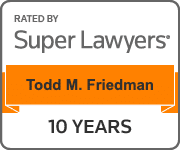The Federal Trade Commission, (FTC) sued Credisure America and MyiPad, following allegations that they used robocalls to get financial information from consumers by offering them bogus “refunds.” “The Defendants placed illegal robocalls to consumers and played a prerecorded message alerting consumers to visit the website ftcrefund.com,” according to the complaint. During the message, a prerecorded voice states the following: “Please visit www.ftcrefund.com, www.ftcrefund.com. Your seizure ID number is 123223, again your seizure ID number is 123223. Visit right now www.ftcrefund.com. Your seizure ID number is 123223. Thank you and have a nice day.”
The scammers used a procedure called “spoofing” to make the calls look like they were coming from a legitimate FTC phone number, 877-FTC-HELP, which is the FTC’s toll-free consumer response phone number. Victims who visited the defendants’ websites are told that CrediSure America specialized in private financial forensic and investigation. “Our main targets are large telemarketing and infomercial firms who get shutdown by the FTC for misrepresenting or simply defrauding customers like your self,” according to the complaint. The scam artists then ask for the victim’s bank information so that the refund can be processed into their account.
The defendants also state that their fee is a percentage of the refund obtained from the FTC: “For only 5.55% we take care of your refund and process it in less than 7 business days as opposed to the standard 8 to 10 weeks.” “The page informs consumers that, to process the supposed refund, consumers must provide their: address, phone number, bank number (including the name listed on the account), account number, ABA/routing number, and a check number.” According to the FTC, they do not direct deposit redress; the FTC mails paper checks directly to redress recipients. Moreover, the FTC does not publish the names of consumers due to receive redress from FTC consumer protection litigation.
In short, defendants’ claims are false. Defendants cannot expedite consumer redress, nor can they receive or process redress on behalf of consumers. If you are receiving illegal robo-calls on your cell phone from a telemarketer or a debt collector, you may be entitled to compensation. Please give my office, The Law Offices of Todd M. Friedman a call today at (877) 449-8898 for a free consultation.

















